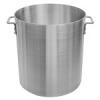I would take a look the equipment leading up to the magnets and examine them for damage. If you're finding actual little chunks of metal then there should be some wear visible. Things like Mills, Pumps, Augers, etc can all be common sources of FM when they become damaged. You may have to disassemble equipment pretty thoroughly to find the source of the damage.
If all your equipment seems undamaged then you should turn your focus to the product itself, perhaps your ingredients have been contaminated by FM. If you're buying powder for instance, the supplier's equipment may be introducing metal.
To answer your question though, "testing" metal for its source isn't something I'm aware of. Most food equipment is made of stainless steel, so I guess if you determined that the metal was something that equipment couldn't possibly be made of then that could rule somethings out...but to me that's an unorthodox approach to this problem.
Edited by Brothbro, 13 September 2024 - 05:18 PM.












